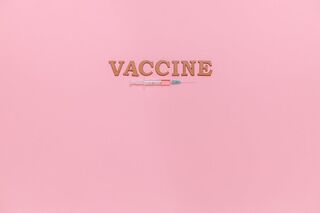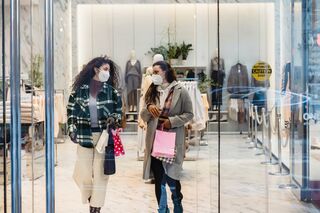Decision-Making
How Willing Are We to Protect Others?
Using psychology to understand helpful decision-making and behaviour change.
Posted December 6, 2021 Reviewed by Devon Frye
Key points
- Understanding how people decide whether to help others is important for encouraging vaccination and reducing the impact of the pandemic.
- Science can reveal the key influences that make us more or less likely to take action to protect others.
- People are more willing to sacrifice money to avoid harming other people than avoid harming themselves.
- Offering monetary incentives and framing messaging as protecting others can encourage people to help.

Researchers worldwide are racing to understand the threat faced by the new COVID variant, Omicron. In parallel, preventative measures are being deployed to buy time to figure out how worried we should be before the virus spreads. In the UK, these include mandatory mask-wearing on public transport and booster vaccinations. To encourage people to comply, governments have been appealing to us to "protect others" as well as ourselves.
However, research shows that how willing we are to help others depends on how "costly" we perceive it to be. We reflect on research from psychology that helps us understand how people make decisions whether to help others, and how we might encourage behaviour change.
Using Science to Understand Choices: Is It Me or You Who Could Get Hurt?
There are many ways we can help other people with different costs or risks required. For example, we may give up having a nice meal in a restaurant to avoid risking others’ health if there is a chance we have the virus, or we can choose to risk our own health to take food to someone who is isolating with COVID symptoms. What determines the choices we will make in these contexts?
One study measured how much money people will sacrifice to reduce the number of painful electric shocks delivered to either them or an anonymous stranger. Two participants came to the lab and underwent a pain thresholding procedure where they experienced a series of painful electric shocks to figure out their pain tolerance. They were then randomly allocated one of two roles, a "decider" or a "receiver."
The decider had to choose between two options that differed in how much money they could gain, and how many electric shocks would be delivered. Crucially, the money was always for the decider but the electric shocks were either for the decider or the anonymous receiver. The researchers found, surprisingly, that people were much more willing to sacrifice money to protect others than they were to stop harm to themselves. This suggests people are willing to sacrifice their own gains if it protect others from harm.
However, another set of researchers ran a similar experiment but changed it around so that the decider would always experience the shocks and either they or the receiver would get the money. When framed in this way, people seemed to care more about themselves. They were not as willing to give themselves a shock to give money to another person. These findings suggest that people can be helpful, but if you must experience harm yourself, you care less about helping others.
Using Science to Change Behaviour: What Are the Benefits for Me?
So how can we change behaviour to make people more willing to help—and in the context of the pandemic, to encourage people to wear masks, get vaccinated, and take up boosters when offered?
One strategy already used in countries around the world is to offer rewards for vaccination. In the U.S., Krispy Kreme gave out free doughnuts and one state ran a lottery with a $1 million prize for those with vaccination proof. From the perspective of psychological research, this makes sense. If we make behaviours seem less costly to ourselves, we are more willing to do them. But does research support the impact of incentives?
A recent study published in the journal Science showed that monetary incentives did indeed increase take-up of vaccination. The researchers conducted a rigorous randomized control trial in Sweden which assigned people to different groups that received either a small cash reward of approximately $24 or nothing. Those in the cash reward group were around 4 percentage points more likely to get vaccinated than the control group.

Using Science to Change Behaviour: What Are the Benefits for Our Community?
Another strategy could be to focus on the benefits for other people, instead of increasing the value of acts for ourselves. Some research suggests that framing messaging in altruistic terms—to "protect others"—might help. In fact, the monetary incentive study also compared a group who received a "social" behavioural nudge where they were asked to write down four people who could benefit from the participant getting vaccinated. The authors observed a positive effect of 2.2 percentage points on intentions for vaccination, but it was not statistically significant and the impact on actual vaccination rates was even less (1.4 percentage points).
However, another study compared framing messages as either keeping yourself safe, keeping your community safe, or keeping yourself and community safe, in the early stages of the pandemic (March 2020). They found that community messaging was more effective than personal messaging for behavioural intentions. In a follow-up where these messaging strategies were used to motivate contact-tracing app signups, they found that personal and community messaging combined was the most effective compared to personal or community messaging alone.
These studies suggest that closely considering whether to highlight protective behaviours as helping ourselves and/or others can be critical for reducing the impact of the pandemic. As Dr. Rochelle Walensky Director of the U.S. Centers for Disease Control and Prevention recently commented about how to end the pandemic: "I think a lot of it depends on human behavior."
References
Campos-Mercade, P., Meier, A.N., Schneider, F.H., Meier, S., Pope, D., and Wengström, E. (2021). Monetary incentives increase COVID-19 vaccinations. Science 374, 879–882.
Crockett, M.J., Kurth-nelson, Z., Siegel, J.Z., Dayan, P., and Dolan, R.J. (2015). Harm to others outweighs harm to self in moral decision making. Proc. Natl. Acad. Sci. 112, 201424572.
Jordan, J.J., Yoeli, E., and Rand, D.G. (2021). Don’t get it or don’t spread it: comparing self-interested versus prosocial motivations for COVID-19 prevention behaviors. Sci. Rep. 11, 20222.
Volz, L.J., Welborn, B.L., Gobel, M.S., Gazzaniga, M.S., and Grafton, S.T. (2017). Harm to self outweighs benefit to others in moral decision making. Proc. Natl. Acad. Sci. 114, 7963–7968.




